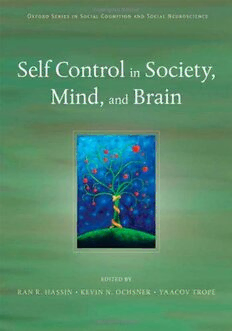
Self Control in Society, Mind, and Brain (Oxford Series in Social Cognition and Social Neuroscience) PDF
575 Pages·2010·7.196 MB·English
Most books are stored in the elastic cloud where traffic is expensive. For this reason, we have a limit on daily download.
Preview Self Control in Society, Mind, and Brain (Oxford Series in Social Cognition and Social Neuroscience)
Description:
How do we - societies and individuals alike - (sometimes) manage to act in line with our high priority goals when faced with tempting-yet-conflicting alternatives? In other words, how do we (sometimes) resolve a conflict between a superordinate, global goal and a subordinate, local one, and do so in favor of the global goal? These types of self-control dilemmas can be found in many contexts and may be described at many levels of analysis. Examples include the dilemmas faced by groups fostering cooperation among their members, when defection is more beneficial for each individual; dieters resisting a tempting cake, and the cognitive system trading off speed for accuracy in conflict tasks like the Stroop. This book presents social, cognitive and neuroscientific approaches to the study of self-control, connecting recent work in cognitive and social psychology with recent advances in cognitive and social neuroscience. It consists of three sections: The Social, The Mental, and The Brain. The "Mental" section is the book's anchor, examining within-individual self-control processes at all levels: from low-level attention to motivation and motivational systems. The "Social" section looks at group processes, broadly defined, and how groups and societies (attempt to) resolve conflicts between their global goals and the individual's self interest. The "Brain" section explores the brain processes that underlie self control attempts and speak directly to mental-level processes. In bringing together multiple perspectives on self-control dilemmas from internationally renowned researchers within various allied disciplines, this will be the first single-reference volume to illustrate the richness, depth, and breadth of the research in the new field of self control.
See more
The list of books you might like
Most books are stored in the elastic cloud where traffic is expensive. For this reason, we have a limit on daily download.
